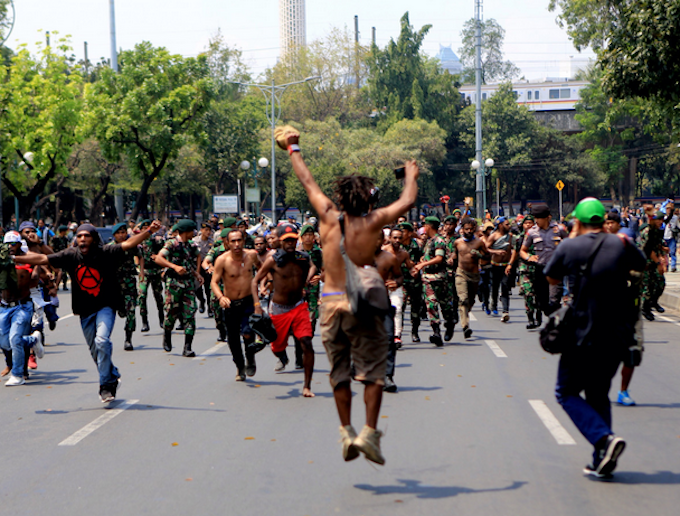
By Budi Sutrisno in Jakarta
A court in East Kalimantan has found seven Papuans guilty of treason in separate trials for their involvement in antiracism protests in Jayapura, Papua, in 2019, despite calls from human rights defenders for authorities to drop all charges against them.
The Balikpapan District Court sentenced Buchtar Tabuni, an executive of pro-Papuan independence group United Liberation Movement for West Papua (ULMWP), yesterday to 11 months of imprisonment.
Meanwhile, Cenderawasih University student union head Ferry Kombo, as well as Irwanus Uropmabin and Hengki Hilapok, both students of the University of Science and Technology (USTJ), were sentenced to 10 months in prison.
READ MORE: Indonesian court issues guilty verdicts in West Papua trial
The punishment handed down by the court was far from the demands of prosecutors, who sought 17 years of imprisonment for Buchtar, 10 years for Ferry and 5 years for both Irwanus and Hengki.
Two other defendants in the case, namely Agus Kossay and Stevanus Itlay from the National Committee of West Papua (KNPB), were sentenced to 11 months of imprisonment after prosecutors had demanded 15 years.
Meanwhile, USTJ student union head Alexander Gobai was sentenced to 10 months in prison. The prosecutors had sought 10 years of imprisonment for him.
“We are given a week to think about whether we will file an appeal or not. We will discuss further with the seven political prisoners and figure out if they can accept [the verdicts],” Emanuel Gobay, one of the defence lawyers, told The Jakarta Post.
West Papua Uprising
The seven students and activists were involved in Jayapura protests widely known as the Papua Uprising in August last year following a racially charged incident targeting Papuan university students living in a dormitory in Surabaya, East Java.
“Your Excellencies, it’s not that I am objecting the 11 months sentence, but my consience says that I am innocent,” said Buchtar Tabuni.
He was not involved on the West Papua Uprising last year at all due to different political opinion. pic.twitter.com/2n2EuxKoSo
— Veronica Koman (@VeronicaKoman) June 17, 2020
The students were physically and verbally attacked by security personnel and members of local mass organisations, who accused them of refusing to celebrate Indonesia’s 74th Independence Day.
Security personnel reportedly banged on the dormitory’s door while shouting insults like “monkeys”, “pigs” and “dogs”.
Jayapura, West Papua today (17/6/20) pic.twitter.com/BC82P3yp2F
— Veronica Koman (@VeronicaKoman) June 17, 2020
The protests in Jayapura started out peacefully but later turned violent, resulting in dozens of injuries and several buildings being damaged. The seven activists were arrested in Jayapura and were moved for trials in Balikpapan earlier this year for security reasons.
The trials have been met with an outcry from the public and from activists, with many demanding that authorities drop all charges, as they argued that the Papuans involved in the rallies had only been exercising their right to protest over racism against them.
Over the past three days prior to the verdicts scheduled for Wednesday, rallies carried out by students and young people demanding the defendants’ release took place in various cities across the country.
Human rights activists have lambasted the arrests and charges against the Papuans, saying that acts of treason and reactions against racism were two different things.
They also argued that perpetrators of racism against Papuans, including hoax spreaders and verbal attackers, had been charged with less than a year of imprisonment.
‘Racism under justice system’
“Despite the leniency, the verdicts still reflect racism under Indonesia’s justice system. No matter what happens, West Papuans ‘must’ be found guilty by Indonesian courts, especially in treason and incitement cases,” Indonesian human rights lawyer Veronica Koman said on her Twitter account.
Koman told the Post that, during the antiracism protests last year, 86 Papuans were arrested and charged with treason. Some were immediately released, leaving 56 to be processed legally.
Some of the 56 Papuans have been sentenced to prison and recently been released, including Surya Anta and Ariana Elopere, who were spotted among the crowd during Monday’s rally in front of the Supreme Court building in Central Jakarta.
“There was no political intervention, because those who are now released have fully served their sentences,” Koman said, adding that 23 of 36 Papuans still being detained would face their first hearing in Fakfak, West Papua, later this week.
Amnesty International Indonesia executive director Usman Hamid said he deeply regretted the court rulings against the seven Papuans engaging in peaceful protests, arguing that such a decision showed that the state failed to uphold human rights for Papua.
“Although the verdicts were much lighter than the demand of prosecutors, the seven prisoners of conscience should not have been arrested, imprisoned and prosecuted from the start.
“They should be released will all charges dropped,” Usman said in a statement.
“In the era of president BJ Habibie, East Timorese political prisoners or prisoners of conscience were released. President Jokowi himself even freed five Papuan prisoners of conscience at the beginning of his first term,” he said.












































